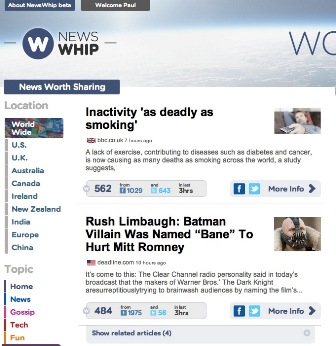 A Q&A with SimpleReach president Bryan Birsic. The New York City–based company was founded in 2010 and raised $1.6 million in Seed funding in mid-June. Investors include High Peaks and Village Ventures.
A Q&A with SimpleReach president Bryan Birsic. The New York City–based company was founded in 2010 and raised $1.6 million in Seed funding in mid-June. Investors include High Peaks and Village Ventures.
SUB: Please describe SimpleReach and the value proposition you offer to content publishers.
Birsic: SimpleReach allows content creators to see every single share of their content across all significant social networks, and tie all of that sharing behavior to actual traffic driven to their properties.
SUB: Who are your target users?
Birsic: Anyone who creates content and would like more sharing and traffic from Facebook, Twitter, Pinterest, Reddit, StumbleUpon, Google Plus, LinkedIn, Digg.
SUB: Who do you consider to be your competition?
Birsic: The only product that can tie social sharing data to on-site traffic is a very customized version of Google Analytics or Omniture. First, you need to be really familiar with these systems to pull that off, and that keeps all the people that really need to understand what’s happening socially with their content—editors, writers, executives—from getting into the data. They get monthly reports that miss all the nuance. And there’s no one else in market that algorithmically ties current sharing behavior to future socially-driven traffic, easily compares what content works on what network and ties all of that to pageviews, and slices all of that interaction by a topic or a tag. And all of this data is holistic, as we get it from the respective social fire hoses, and as real-time as the various APIs allow. Frankly we don’t see anyone else doing what we are—being zealously focused on how content interacts with a wide variety of social channels, and how that sharing and liking and pinning translates to monetizable traffic.
SUB: What differentiates SimpleReach from the competition?
Birsic: I think I spoke to that [in the last question] in terms of product. What truly separates us is our team, though. Frankly I feel extremely lucky to be on the team, as everyone on our team is at the top of their respective skill sets and communities. The product is imperfect right now, as we determine where and how social intelligence adds the most value inside of some of the largest media organizations in the world, however I know that it will be exponentially more useful, focused, well-designed, and scalable in six months because of the people improving it each day.
SUB: When was the company founded and what were the first steps you took in establishing it?
Birsic: The company was founded in the summer of 2010 around the thesis that there were market-defining opportunities at the intersection of content and social. We built three products that were pushed into market in less than a year. The fourth product we built was The Slide, a runaway success content recommendation plug-in, and in the summer of 2011 we went to San Francisco to participate in AngelPad, an incubator program founded and run by ex-Googlers. I was serving as an informal advisor at the time, as a friend and early-stage investor at Village Ventures, and joined as President in November 2011. The new SimpleReach is the result of all our learnings with previous products, amazing mentorship from AngelPad and of course, a bit of luck.
SUB: What was the inspiration behind the idea for SimpleReach? Was there an ‘aha’ moment, or was the idea more gradual in developing?
Birsic: It’s something of a classic pivot story, in that by building one thing, a content recommendation product, we gained knowledge and skills that made a new product possible, a real-time social data and intelligence product. We started incorporating social signal into the contextual and the behavioral, that had formed the backbone of the recommendation engine. The social signal meaningfully increased clicks on the articles, and the underlying data showed us just how much sharing of content was happening. And not just on Facebook, but across a wide variety of channels, including socially-driven aggregators like Reddit, StumbleUpon and Digg.
In order to build social sharing and action data into our recommendations, the team built all of the infrastructure and data cleaning to digest and rapidly make decisions with social API data. We also built a strong knowledge of CMSs in working with content creators to get The Slide recommendation unit working. So in a lot of ways we were optimally positioned to do what we’re doing now.
When we spoke with content creators, they saw the rising percent of traffic coming from social channels, the rise of significant networks besides Facebook, and knew they needed to invest in better data and a quantitative understanding of how their content performed socially. However, many publishers do not have the technical bandwidth or skills in-house to tackle this challenge. So we raised a Seed round from some fantastic VCs, closed sign-ups on The Slide, and built a market-defining social intelligence product in six months. Now only three months since launch, the social intelligence product is on thousands of sites with hundreds of millions of monthly pageviews, including some of the largest sites on the web. And we’ve got plans to open The Slide to new users again, still for free, and with free social analytics add-ons that vastly exceed what the long tail market has access to anywhere else.
SUB: What have the most significant obstacles been so far to building the company?
Birsic: I think the biggest challenge for any management team is navigating the waters of culture, hiring, changing roles, personalities—incidentally, we have found this last one is highly correlated with outstanding, outlier capability. My experience has been that the best teams are almost impossible to stop in a market with opportunity. So, a lot of the challenge is building and creating the best team and culture possible.
SUB: You recently raised $1.6 million in Seed funding. How do you plan to use the funds and what are your goals for SimpleReach over the next year or so?
Birsic: We plan to build the largest dataset of social sharing of content and the traffic it drives, and with it the most sophisticated understanding of the relationship between, and the value of, social sharing and content. I won’t say what we have planned, but I think if you spend five minutes in front of a whiteboard brainstorming what you could do with that dataset, you’ll see why we’re so excited about what we’re doing right now.
SUB: Do you plan to raise more outside funding in the near future?
Birsic: We’re not actively looking for new investors. We’re of course always having conversations with investors though.
SimpleReach – www.simplereach.com











